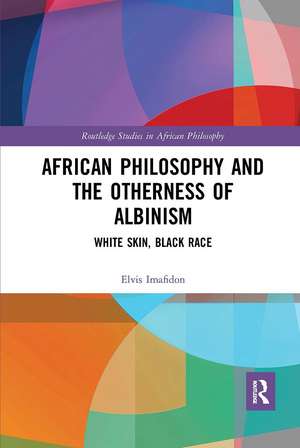African Philosophy and the Otherness of Albinism: White Skin, Black Race: Routledge Studies in African Philosophy
Autor Elvis Imafidonen Limba Engleză Paperback – 30 sep 2020
How has albinism emerged as a thick concept in African traditions? What are these deeply entrenched ideas about the ontology of albinism in African thought? What epistemic injustice has been done to persons with albinism in Africa places? Why do harmful beliefs about albinism still persist in modern African societies? How does the African communalistic ethic justify the harm done against persons with albinism? What is the duty to, and burden of, care for persons with albinism? What peculiar existential challenges do persons with albinism in general and females with albinism in particular face in African societies and how can they be overcome? What can be learnt from the education philosophy of reconstructionism and genetic engineering in improving the wellbeing of persons with albinism? African Philosophy and the Otherness of Albinism: White Skin, Black Race digs deep into these philosophical questions revealing fascinating but latent aspects of how albinism is understood in African places as a necessary step to take in improving the wellbeing and integrity of persons with albinism in Africa today.
This book will be of interest to scholars and students of African philosophy, sociology, African studies and disability studies.
Preț: 269.39 lei
Preț vechi: 324.87 lei
-17% Nou
Puncte Express: 404
Preț estimativ în valută:
51.55€ • 53.18$ • 43.02£
51.55€ • 53.18$ • 43.02£
Carte tipărită la comandă
Livrare economică 26 martie-09 aprilie
Preluare comenzi: 021 569.72.76
Specificații
ISBN-13: 9780367664718
ISBN-10: 0367664712
Pagini: 162
Dimensiuni: 156 x 234 x 16 mm
Greutate: 0.3 kg
Ediția:1
Editura: Taylor & Francis
Colecția Routledge
Seria Routledge Studies in African Philosophy
Locul publicării:Oxford, United Kingdom
ISBN-10: 0367664712
Pagini: 162
Dimensiuni: 156 x 234 x 16 mm
Greutate: 0.3 kg
Ediția:1
Editura: Taylor & Francis
Colecția Routledge
Seria Routledge Studies in African Philosophy
Locul publicării:Oxford, United Kingdom
Public țintă
Postgraduate and UndergraduateCuprins
Introduction: Albinism, Difference and the Philosophical Turn Chapter One: Albinism and African Thick Conceptualisation Chapter Two: The Ontology of Albinism in African Traditions Chapter Three: The Epistemology of Albinism in African Traditions Chapter Four: The Ethics of Albinism in African Traditions Chapter Five: Albinism in Africa: Some Existential Issues Chapter Six: Overcoming the Violent Othering of Albinism in Africa Today
Notă biografică
Elvis Imafidon is a lecturer in the Department of Philosophy at Ambrose Alli University, Nigeria, and Fellow of the Johannesburg Institute for Advanced Study (JIAS). He is the editor of Ontologized Ethics: New Essays in African Meta-ethics (2013) and The Ethics of Subjectivity: Perspective since the Dawn of Modernity (2015). He is also the author of The Question of the Rationality of African Traditional Thought: An Introduction (2013).
Recenzii
This is a seminal book on albinism, the philosophical examination of its nature, the social or moral attitudes toward it, the foundations for such attitudes, and how albinism is understood in African traditions, in terms of perceiving albinism as a form of disability, ‘difference’, or ‘abnormality’ in African traditions. Dr. Imafidon brings a novel and an original philosophical perspective to the issue of albinism in African cultures—an issue that has not been previously addressed, at least, philosophically. To the best of my knowledge, this is the first book to address philosophically the issue albinism. This book addresses this issue in a comprehensive way, bringing to bear on the analysis, various philosophical perspectives: conceptual, biological, ontological, epistemological, metaphysical, ethical, existential and phenomenological. I find the ideas and arguments in the book and, the book as a whole, to be properly conceived, well-articulated, and conceptually and methodologically sound. — Professor Polycarp Ikuenobe, Kent State University
This is the book we’ve all been waiting for! African Philosophy and the Otherness of Albinism: White Skin, Black Race is a comprehensive response to that pertinent question raised so often in the last decade: "why, in this day and age, do people in Sub Saharan Africa stigmatize persons with albinism and in some cases, believe that their body parts can be used for good luck in witchcraft potions and rituals?" The answer to that question was never simple. Imafidon breaks down the complexities at play by appropriately using the philosophical point of view, which is capable of concurrently and interconnectedly dissecting issues that span both material and supernatural realities - necessary contexts for any in-depth look at albinism in Africa. This book is written in a very accessible way so it is a must-read for everyone who wishes to understand albinism in Africa and the root causes of discrimination,
This is the book we’ve all been waiting for! African Philosophy and the Otherness of Albinism: White Skin, Black Race is a comprehensive response to that pertinent question raised so often in the last decade: "why, in this day and age, do people in Sub Saharan Africa stigmatize persons with albinism and in some cases, believe that their body parts can be used for good luck in witchcraft potions and rituals?" The answer to that question was never simple. Imafidon breaks down the complexities at play by appropriately using the philosophical point of view, which is capable of concurrently and interconnectedly dissecting issues that span both material and supernatural realities - necessary contexts for any in-depth look at albinism in Africa. This book is written in a very accessible way so it is a must-read for everyone who wishes to understand albinism in Africa and the root causes of discrimination,
Descriere
This book explores from a philosophical perspective one of the most problematic, paradoxical and disturbing disability issue in African contexts and societies, albinism













